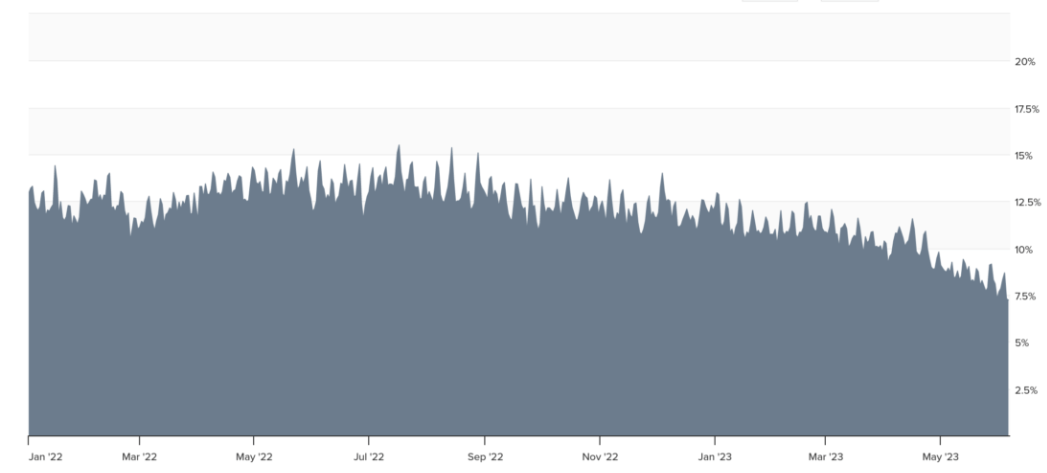An apparent change to Facebook’s algorithm in May caused a dramatic drop in traffic to news and media websites, according to a growing list of publishers and data from Echobox, a social media management company.
It’s a troubling change in an increasingly frail digital news business, where companies have little choice but to rely on social media’s biggest gatekeeper. Publishers say they deserve transparency, but as with similar changes in the past, there’s been no communication from Meta, Facebook’s parent company. In fact, Meta did not respond to Gizmodo’s request for comment on the matter.
Sources who spoke to Gizmodo all say the shift started in February and worsened in the months following. “There’s been a significant downward trend, and it’s an important platform for us because our audience is disproportionately on Facebook. It makes up about 25 per cent of our traffic,” said Robert Chappell, Executive Editor at Madison 365, a nonprofit newsroom that covers communities of colour in Wisconsin. “You never know what’s going to change. It makes it hard to plan for the future.”
Clicks coming from Facebook have been in decline for about a year, but that drop accelerated rapidly in May 2023, according to Echobox, which collects data from more than 2,000 publishers worldwide. Across Echobox’s clients, the share of traffic coming from Facebook fell about 50% from summer of last year.
“It’s difficult to say with certainty what the causes are, but Facebook has made no secret about its intention to deprioritize news on its platform and give greater precedence to video content, which by nature results in less clickthrough traffic,” said Antoine Amann, CEO of Echobox. “It can be extremely challenging for publishers to be at the mercy of third-party platforms, with performance and revenues severely impacted by algorithmic changes over which they have no control.”

One employee at a sports and culture news site with millions of Facebook followers told Gizmodo, “We noticed a sustained pullback in mid to late February. At first we assumed it was our fault and we’d made some kind of mistake, but as time went on, other publishers in our space reported the same thing.”
Unexpected turbulence in social media traffic is at partly to blame for a recent flurry of business collapses at news companies, such as a bankruptcy filing at Vice Media and the shuttering of BuzzFeed News. Nicholas Carlson, Editor in Chief of Insider, named a severed connection to Facebook as one of the major headwinds causing declining traffic at his company’s sites, which recently laid off employees and endured a combative strike that ended Thursday.
“Traffic is down. Subs are down. Video views are down. That was true two weeks ago and has been true for months, so I’m not talking about the impact of a strike. I’m talking about a changing reading and watching environment where Facebook is no longer sharing links,” Carlson wrote.
Facebook is no stranger to opaque changes with major ramifications for the companies that make its most popular content. Most significant is Facebook’s infamous 2015 “pivot to video” when the company touted false metrics about how popular video content was on the platform and encouraged publishers make more videos. That prompted a media-industry-wide shift with heavy investments in producing video content (and corresponding layoffs in other departments) that, in reality, users weren’t watching.
“Our content has provided a lot of value to Facebook, we’ve been a part of the ecosystem since they launched Facebook Pages over a decade ago. But as a small business, it seems like Facebook doesn’t respect us,” the sports and culture site employee said. They asked to remain anonymous for fear of retaliation by Facebook.
More recently, publishers’ numbers tanked after the 2020 presidential election, when Facebook made a short-lived change to deprioritize news content on an increasingly divisive platform.
Insider EIC @nichcarlson addresses the newsroom post-strike, says “after a few years of drift,” the media company is returning to its core focus of business, economy, and tech coverage and becoming “the next-gen WSJ” pic.twitter.com/IBBmoz0lPp
— Max Tani (@maxwelltani) June 15, 2023
Making matters worse, Chappell, Madison 365’s editor, told Gizmodo that the performance of content is varying noticeably based on the subject matter. He said Meta isn’t just deciding whether or not users see more news, it’s deciding what kind of news shows up in users’ feeds.
“Over the past three or four months, anything that’s controversial or related to substantive policy news gets suppressed, but if it’s news about something relatively simple and happy, the algorithm amplifies it,” he said. Though Facebook did not confirm his assertion, leaked internal conversations at Facebook have shown executives debating about whether users should see more content judged as “positive” or “negative.”
Chappell said Madison 365’s top story on Facebook in May was an article about a new principal at a Middle school, which reached 120,000 users. “Meanwhile, a story about the Republican Speaker of the Assembly announcing he’s going to cut diversity, equity, and inclusion programs at the University of Wisconsin went to less than 1,000 people,” Chappell said, numbers that were completely different from how those stories performed on other social networks and on Madison 365’s own website.
“That’s not necessarily a complaint, because the story about the middle school is important to a lot of people, too,” Chappell said, though he added it was troubling to see Facebook making what he believes amount to editorial decisions — especially without acknowledgment from the company.
The digital media industry’s dependence on Facebook, once well-known as a firehose of traffic, is well-documented and one-sided. In May, Meta threatened to block news links altogether on Facebook and Instagram in California in response to a bill moving through the state legislature that would force tech platforms (Google as well as Meta) to pay publishers for news content.
Meta hasn’t blocked news in California altogether, but its platforms could be suppressing news content in more subtle ways. Whistleblowers claimed Meta blocked not only news but also the pages for hospitals and fire services in Australia in 2021 in response to a similar proposed law. Meta denied that allegation, saying the blocked pages were an unintentional flub.
The media workers Gizmodo spoke to stressed that Meta is a private company that is free to make changes and doesn’t owe anyone traffic or revenue. But the publishers said, at the very least, they deserve communication.
“If I knew that this was how things were gonna be for the next year I’d make strategic adjustments. But I don’t even know if this will change in two months,” Chappell said. “We invest all this time and energy, but you can’t get a hold of anyone. At the end of the day, they’re a big company, and we’re a tiny local news outlet.”
